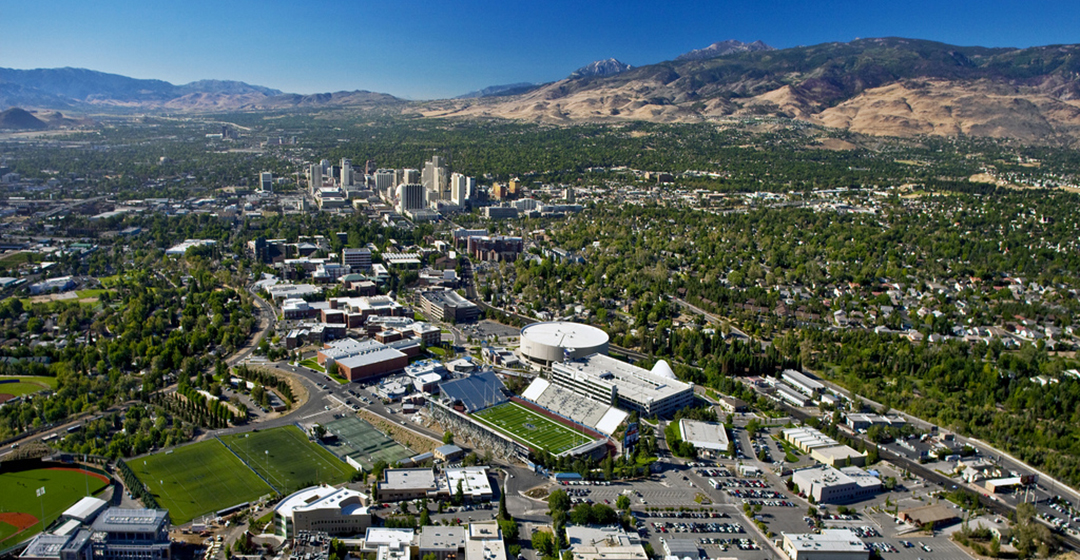Key community business leaders came together last week to hear university experts at The Economic Future of Northern Nevada - Challenges & Opportunities Conference.
"The conference was a chance for our skilled and highly-knowledgeable faculty to share pertinent data with business leaders in our community," Greg Mosier, University of Nevada, Reno College of Business dean, said. "As northern Nevada continues to grow, we want to work hand-in-hand with businesses and local government and provide them with information that can be used as they look to make key strategic decisions."
Conference attendees included representatives from the banking, real estate and finance industries.
Put on by the University and Wells Fargo Private Bank, the two-hour discussion was designed to offer brief, key insights into the following four topics:
1. How Nevada compares to other western states
Presented by George Hammond, director of the Economic and Business Research Center in the Eller College of Management at the University of Arizona.
Key takeaways:
• Last year, job growth was up 2 percent nationally, as opposed to the 3-4 percent growth rates seen in the past few decades. This is likely the result of the aging baby boomer population, meaning tighter labor markets will be a reality going forward.
• Interest rates will rise, likely up to six percent over the next five to six years, but they will not choke off growth.
• Productivity growth is down, with a slow expected growth of 1.4 percent in the next year. This slow growth is a key concern.
• Western states will continue to be attractive to domestic migrants.
• Educational attainment trends will help determine which states generate prosperity. Currently, Nevada is ranked 46th, with 23.2 percent of people with a bachelor's degree or better.
2. How state and local fiscal issues impact counties and cities
Presented by Mehmet Tosun, professor of economics, chair of the University of Nevada Reno's Department of Economics and the Barbara Smith Campbell Distinguished Professor of Nevada Tax Policy.
Key takeaways:
• Nevada's fiscal structure is limited as there is a problem with revenue adequacy and stability.
• Nevada relies heavily on sales and use tax, at the state level, which can be volatile, especially considering the importance of tourism to Nevada's economy, and that the state taxes goods but not services. On a local level, Nevada governments rely heavily on property taxation, which is subject to limitations.
• The state's need for education, infrastructure and health spending is subject to the limited fiscal structure. The aging population could present challenges to the state regarding particularly healthcare spending
• There is a need for a comprehensive tax study to help determine how sustainable Nevada's current fiscal structure is and identify future policy options.
3. The impact of financial market and economic conditions on the areas' economy
Presented by Rahul Bhargava, University College of Business associate professor of finance.
Key takeaways:
• Deregulation should make doing business easier and less costly.
• With low unemployment rates in the state, the housing market should remain strong.
• Rising wages should increase discretionary spending, benefitting firms in the services and hospitality business.
• Low unemployment may lead to a shortage of labor, especially skilled labor.
• Rising interest rates will likely increase the cost of borrowing.
• Energy costs will likely remain low.
4. The future of healthcare challenges and opportunities in northern Nevada.
Presented by Jeanne Wendel, University College of Business professor of economics.
Key takeaways:
• With healthcare expenditures increasing, states are facing a number of tough choices including whether or not Medicaid and the prison system will cover expensive new treatments that will extend life.
• There are serious issues around healthcare inequality, state budget realities and the cost and benefits of new technology.
• The primary driver underlying the upward trend in healthcare expenditures is new treatments stemming from research and development.
• New technologies and new types of providers, that could help drive costs down in healthcare, pose challenges for state and federal regulators.
In addition to these key takeaways, each of the four economy and finance experts at the event offered data that compared Nevada to the rest of the nation and shared information comparing Nevada's economy with other western states over time. Analysts also touched on the current and anticipated impacts that the new administration will have on both the national and state economy.
"The University can be a resource to Nevada's business and government leaders and we want to establish a forum for the communication and exchange of ideas where these groups can come together," Mosier said. "We also plan to create a website that will be a resource for those who are interested in more detailed research and analysis. We are excited to be working with Wells Fargo Private Bank to establish an annual forum for the community."












